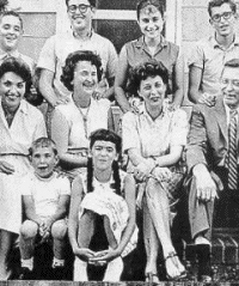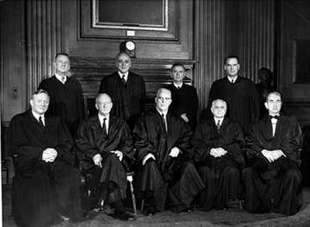Prayer in Public Schools
Engel v. Vitale

In 1962, the school system in New York created a simple, non-sectarian, and non-denominational prayer to be said at the beginning of each class, every school day. They believed that saying this prayer would promote better behavior, spiritual training and a good moral character for all of the students. To some religious leaders this prayer was known as the "to whom it may concern prayer" because it was so bland.
The Regents prayer is shown below.
Almighty God, we acknowledge our dependence upon thee, and we beg Thy blessings upon us, our parents, our teachers and our Country.
The Regents prayer is shown below.
Almighty God, we acknowledge our dependence upon thee, and we beg Thy blessings upon us, our parents, our teachers and our Country.

The supreme court of 1963 that decided prayer in public schools is
unconstitutional
170 years after the ratification of the Constitution and the Bill of Rights, prayer in any form, at any location had never been struck down by a Court. It was made clear in court that the founding fathers intent was stated that religion and morality were meant to be a large part of our society and also, our government. The Court was neither interested in the founding father's intent or views on the subject of prayer in public. The Court even acknowledged openly, its contempt for the heritage of America by stating: "[T]hat [New York] prayer seems relatively insignificant when compared to the governmental encroachments upon religion which were commonplace 200 years ago." The Warren Court later went onto state that it would ignore the Constitution and replace "Separation of Church and State" for the First Amendment.
In conclusion, the answer to the question: "Does the reciting of a nondenominational prayer at the beginning of each class or every school day violate the "establishment of religion clause of the First Amendment?" was decided as yes. The reasoning? As cited on www.oyez.org: "Neither the prayer's nondenominational character nor its voluntary character saves it from unconstitutionality. By providing the prayer, New York officially approved religion. This was the first in a series of cases in which the Court used the establishment clause to eliminate religious activities of all sorts, which had traditionally been a part of public ceremonies. Despite the passage of time, the decision is still unpopular with a majority of Americans."
In conclusion, the answer to the question: "Does the reciting of a nondenominational prayer at the beginning of each class or every school day violate the "establishment of religion clause of the First Amendment?" was decided as yes. The reasoning? As cited on www.oyez.org: "Neither the prayer's nondenominational character nor its voluntary character saves it from unconstitutionality. By providing the prayer, New York officially approved religion. This was the first in a series of cases in which the Court used the establishment clause to eliminate religious activities of all sorts, which had traditionally been a part of public ceremonies. Despite the passage of time, the decision is still unpopular with a majority of Americans."
